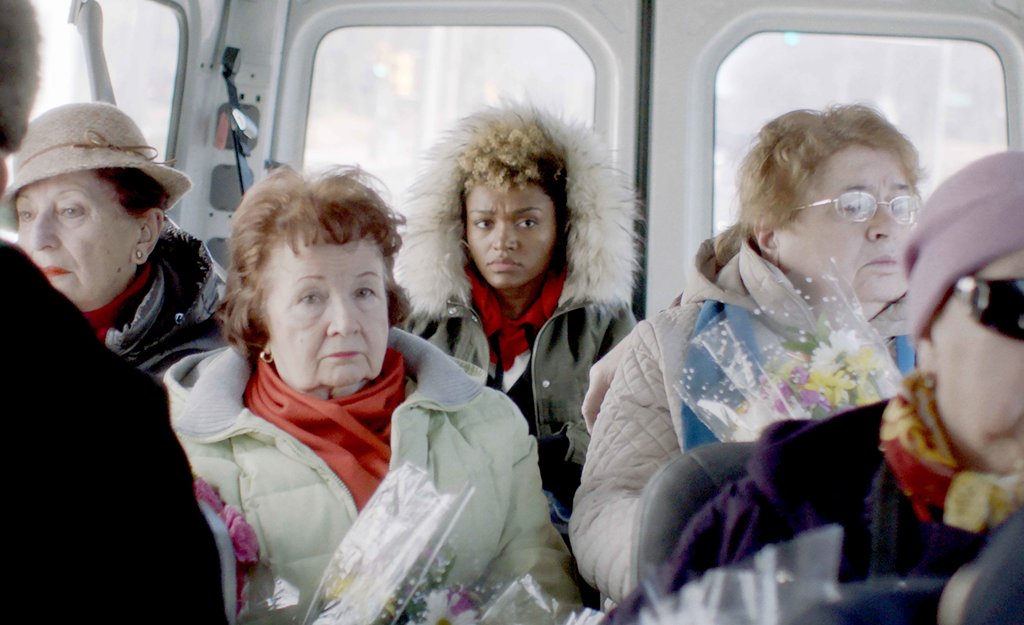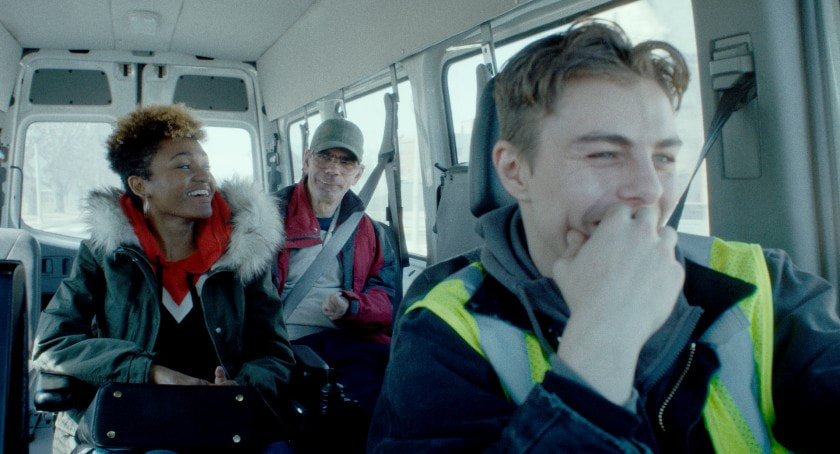Give Me Liberty
Monday, October 21, 7:30 pm

Reviewed by Justin Chang / Los Angeles Times
“Give Me Liberty,” Kirill Mikhanovsky’s wonderful second feature, unfolds over an especially fraught day in wintry Wisconsin. It features a large ensemble that consists almost entirely of nonprofessional actors, many of whom imbue their characters with the depths of their own real-life experience. Several of the actors are members of Milwaukee’s Russian immigrant community; others are regulars at the city’s Eisenhower Center, a vocational training program for people with disabilities.
With its rough-hewn realism and its unglamorous, careworn faces, Mikhanovsky’s film is what you might call, in the tired parlance of the entertainment industry, “a small movie” — a catch-all term for low-budget independent cinema that, in this instance, is nearly as condescending as it is inaccurate. If you are inclined to measure size by something other than a movie’s budget or box office — like, say, richness of character, vividness of texture or generosity of spirit — then this remarkably sustained juggling act may be one of the bigger movies you’ll see this year.
Which is not to say that “Give Me Liberty” announces its enormity right away. On the contrary, its effectiveness is predicated on some ingenious tricks with proportion and scale. Before the end you’ll be surprised at how much can happen in a single day, or in less than two hours of screen time: a funeral, a talent show, an apartment fire, a political protest. You may also be surprised at how many people can fit inside a medical transport van, the crowded, cavernous vehicle that keeps this narrative on the move.
Mikhanovsky drove just such a van as a young man himself, shortly after he moved with his family from Moscow to Milwaukee in 1993. His stand-in here is Vic (a beautifully restrained Chris Galust), a much-put-upon young Russian American who’s having a difficult morning even before he gets behind the wheel. Lean and wiry and fast on his feet, Vic races about trying to keep his grandfather (Arkady Basin) from destroying their shared apartment while also getting him ready for the memorial service of an old friend, Lilya.
Within minutes Vic is wheeling one of his regular passengers, a man who is diabetic and visually impaired, down a hall and into the van, ignoring the surly stream of complaints pouring from his mouth. So far, so normal, but as he barrels over pothole-riddled roads, Vic finds that several of his usual routes have been blocked off due to organized protests in response to a police shooting in a black neighborhood. (Like so much in this movie, the incident feels close to real life — in this case, the public outcry that greeted the 2016 police killing of a black Milwaukee man, Sylville K. Smith.)
Vic also learns that the vehicle that was supposed to transport his grandfather and his fellow mourners to the funeral never showed up. Good, helpful kid that he is, he lets them all pile into his van, putting him and his regular passengers even more behind schedule. Among the mourners is a boisterous Russian boxer named Dima (a terrific Maxim Stoianov), who’s like a walking mascot for the movie’s big-heartedness; he may be the one character who, no matter how chaotic things get — and they get pretty chaotic — is delighted simply to be there.
The breathless, one-damned-thing-after-another momentum of the story — the way it pinballs between ripped-from-the-headlines relevance and pure social-realist screwball — is all the more impressive for its lack of strain. Shot with a swerving handheld camera (by cinematographer Wyatt Garfield) that nonetheless always feels in the right place, “Give Me Liberty” is a full-blown farce on wheels, a master class in controlled, escalating chaos. It is also a heady and rambunctious state-of-the-union address, a movie in which a crowded, noisy van becomes a microcosm of a divided city and perhaps even a divided nation.
The tensions come to a head when Vic picks up Tracy (a superb Lauren “Lolo” Spencer), an advocate for people with disabilities who’s on her way to help a friend, Steve (Steve Wolski), with a job interview. Vic arrives an hour late but just in time to help one of Tracy’s family members carry a hefty mattress into the house. Meanwhile, Tracy, who has ALS, must maneuver her motorized wheelchair into a van crowded with mourners, who curse, complain, sing Russian folk songs, play the accordion and occasionally bring to mind Jean-Paul Sartre’s famous declaration that hell is other people.
Played with winning, tough-talking charisma by Spencer, Tracy berates Vic for his endless delays and detours, at one point telephoning his employer, who is already barking orders at him over the radio. But their initially spiky dynamic quickly becomes the movie's narrative thrust and emotional center. As they stop fighting and just lean into the day's insanity, they realize that they have more in common than expected -- namely, an instinct to help others and, consequently, a lot of people who depend on them.
Crucially, Vic never becomes a conventional hero or savior figure, and his fondness of feeling for his passengers isn’t sentimentalized as it might be in another movie. Disability here isn’t something to be exploited for the moral and emotional improvement of the able-bodied. Vic’s function in the story is, on one level, purely practical: He is the one whose job brings these disparate individuals together, forcing them to coexist for a few hours. He’s also the one who bears the brunt of their frustrations, scrambling to help them after the nameless, faceless structures of society have let so many of them down.
“Give Me Liberty” is remarkable not just for its authenticity but for the way it serves up that authenticity sans self-congratulation. There are no showboating gestures here, only a bone-deep commitment to showing us the lives of individuals often relegated to the cinematic sidelines, to the extent that the movies even notice them all. Spencer, like many of her co-stars, is a person with a disability playing a person with a disability. So, too, is James Watson as a friend of Vic’s whose periodic reflections on life and love frame the movie, providing gorgeous moments of stillness and respite amid the tumult.
There are other lovely scenes of connection in “Give Me Liberty,” including an extended stopover at the Eisenhower Center, where one of Vic’s passengers warbles “Rock Around the Clock” at a talent show and Dima gets caught up playing video games with some effortlessly made new friends. Later, after night has fallen and the van has finally emptied out, two people will tenderly embrace amid a protest that suddenly turns violent, and a family will invite two strangers to share a meal at their table. The movie doesn’t telegraph or slow down for these moments so much as stumble upon them with an artlessness that is, paradoxically, the surest sign of its art.
“Give Me Liberty,” Kirill Mikhanovsky’s wonderful second feature, unfolds over an especially fraught day in wintry Wisconsin. It features a large ensemble that consists almost entirely of nonprofessional actors, many of whom imbue their characters with the depths of their own real-life experience. Several of the actors are members of Milwaukee’s Russian immigrant community; others are regulars at the city’s Eisenhower Center, a vocational training program for people with disabilities.
With its rough-hewn realism and its unglamorous, careworn faces, Mikhanovsky’s film is what you might call, in the tired parlance of the entertainment industry, “a small movie” — a catch-all term for low-budget independent cinema that, in this instance, is nearly as condescending as it is inaccurate. If you are inclined to measure size by something other than a movie’s budget or box office — like, say, richness of character, vividness of texture or generosity of spirit — then this remarkably sustained juggling act may be one of the bigger movies you’ll see this year.
Which is not to say that “Give Me Liberty” announces its enormity right away. On the contrary, its effectiveness is predicated on some ingenious tricks with proportion and scale. Before the end you’ll be surprised at how much can happen in a single day, or in less than two hours of screen time: a funeral, a talent show, an apartment fire, a political protest. You may also be surprised at how many people can fit inside a medical transport van, the crowded, cavernous vehicle that keeps this narrative on the move.
Mikhanovsky drove just such a van as a young man himself, shortly after he moved with his family from Moscow to Milwaukee in 1993. His stand-in here is Vic (a beautifully restrained Chris Galust), a much-put-upon young Russian American who’s having a difficult morning even before he gets behind the wheel. Lean and wiry and fast on his feet, Vic races about trying to keep his grandfather (Arkady Basin) from destroying their shared apartment while also getting him ready for the memorial service of an old friend, Lilya.
Within minutes Vic is wheeling one of his regular passengers, a man who is diabetic and visually impaired, down a hall and into the van, ignoring the surly stream of complaints pouring from his mouth. So far, so normal, but as he barrels over pothole-riddled roads, Vic finds that several of his usual routes have been blocked off due to organized protests in response to a police shooting in a black neighborhood. (Like so much in this movie, the incident feels close to real life — in this case, the public outcry that greeted the 2016 police killing of a black Milwaukee man, Sylville K. Smith.)
Vic also learns that the vehicle that was supposed to transport his grandfather and his fellow mourners to the funeral never showed up. Good, helpful kid that he is, he lets them all pile into his van, putting him and his regular passengers even more behind schedule. Among the mourners is a boisterous Russian boxer named Dima (a terrific Maxim Stoianov), who’s like a walking mascot for the movie’s big-heartedness; he may be the one character who, no matter how chaotic things get — and they get pretty chaotic — is delighted simply to be there.
The breathless, one-damned-thing-after-another momentum of the story — the way it pinballs between ripped-from-the-headlines relevance and pure social-realist screwball — is all the more impressive for its lack of strain. Shot with a swerving handheld camera (by cinematographer Wyatt Garfield) that nonetheless always feels in the right place, “Give Me Liberty” is a full-blown farce on wheels, a master class in controlled, escalating chaos. It is also a heady and rambunctious state-of-the-union address, a movie in which a crowded, noisy van becomes a microcosm of a divided city and perhaps even a divided nation.
The tensions come to a head when Vic picks up Tracy (a superb Lauren “Lolo” Spencer), an advocate for people with disabilities who’s on her way to help a friend, Steve (Steve Wolski), with a job interview. Vic arrives an hour late but just in time to help one of Tracy’s family members carry a hefty mattress into the house. Meanwhile, Tracy, who has ALS, must maneuver her motorized wheelchair into a van crowded with mourners, who curse, complain, sing Russian folk songs, play the accordion and occasionally bring to mind Jean-Paul Sartre’s famous declaration that hell is other people.
Played with winning, tough-talking charisma by Spencer, Tracy berates Vic for his endless delays and detours, at one point telephoning his employer, who is already barking orders at him over the radio. But their initially spiky dynamic quickly becomes the movie's narrative thrust and emotional center. As they stop fighting and just lean into the day's insanity, they realize that they have more in common than expected -- namely, an instinct to help others and, consequently, a lot of people who depend on them.
Crucially, Vic never becomes a conventional hero or savior figure, and his fondness of feeling for his passengers isn’t sentimentalized as it might be in another movie. Disability here isn’t something to be exploited for the moral and emotional improvement of the able-bodied. Vic’s function in the story is, on one level, purely practical: He is the one whose job brings these disparate individuals together, forcing them to coexist for a few hours. He’s also the one who bears the brunt of their frustrations, scrambling to help them after the nameless, faceless structures of society have let so many of them down.
“Give Me Liberty” is remarkable not just for its authenticity but for the way it serves up that authenticity sans self-congratulation. There are no showboating gestures here, only a bone-deep commitment to showing us the lives of individuals often relegated to the cinematic sidelines, to the extent that the movies even notice them all. Spencer, like many of her co-stars, is a person with a disability playing a person with a disability. So, too, is James Watson as a friend of Vic’s whose periodic reflections on life and love frame the movie, providing gorgeous moments of stillness and respite amid the tumult.
There are other lovely scenes of connection in “Give Me Liberty,” including an extended stopover at the Eisenhower Center, where one of Vic’s passengers warbles “Rock Around the Clock” at a talent show and Dima gets caught up playing video games with some effortlessly made new friends. Later, after night has fallen and the van has finally emptied out, two people will tenderly embrace amid a protest that suddenly turns violent, and a family will invite two strangers to share a meal at their table. The movie doesn’t telegraph or slow down for these moments so much as stumble upon them with an artlessness that is, paradoxically, the surest sign of its art.
DISCUSSION FOLLOWS EVERY FILM!
$6.00 Members / $10.00 Non-Members
TIVOLI THEATRE
5021 Highland Avenue I Downers Grove, IL
630-968-0219 I www.classiccinemas.com
We apologize—Movie Pass cannot be used for AHFS programs.
$6.00 Members / $10.00 Non-Members
TIVOLI THEATRE
5021 Highland Avenue I Downers Grove, IL
630-968-0219 I www.classiccinemas.com
We apologize—Movie Pass cannot be used for AHFS programs.








